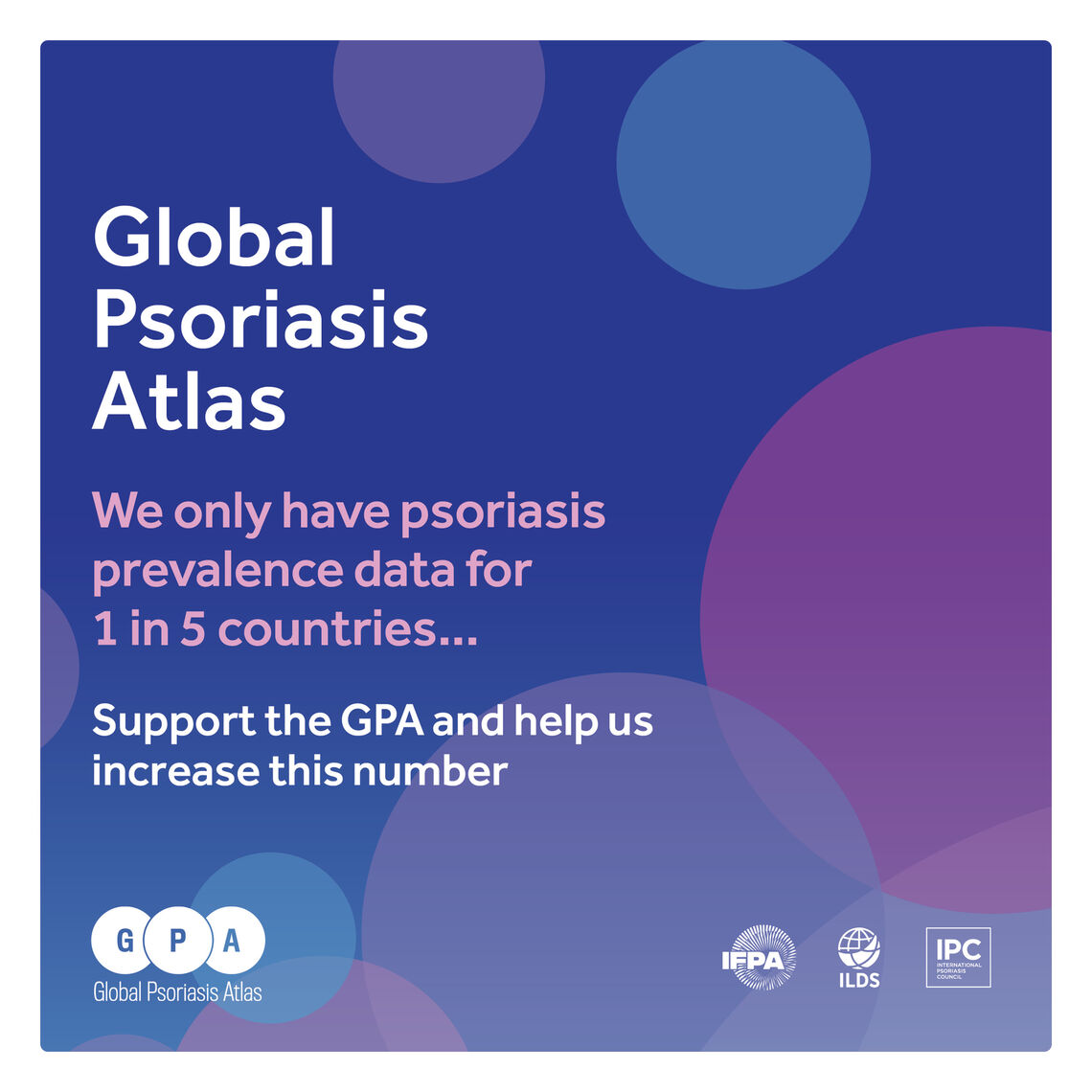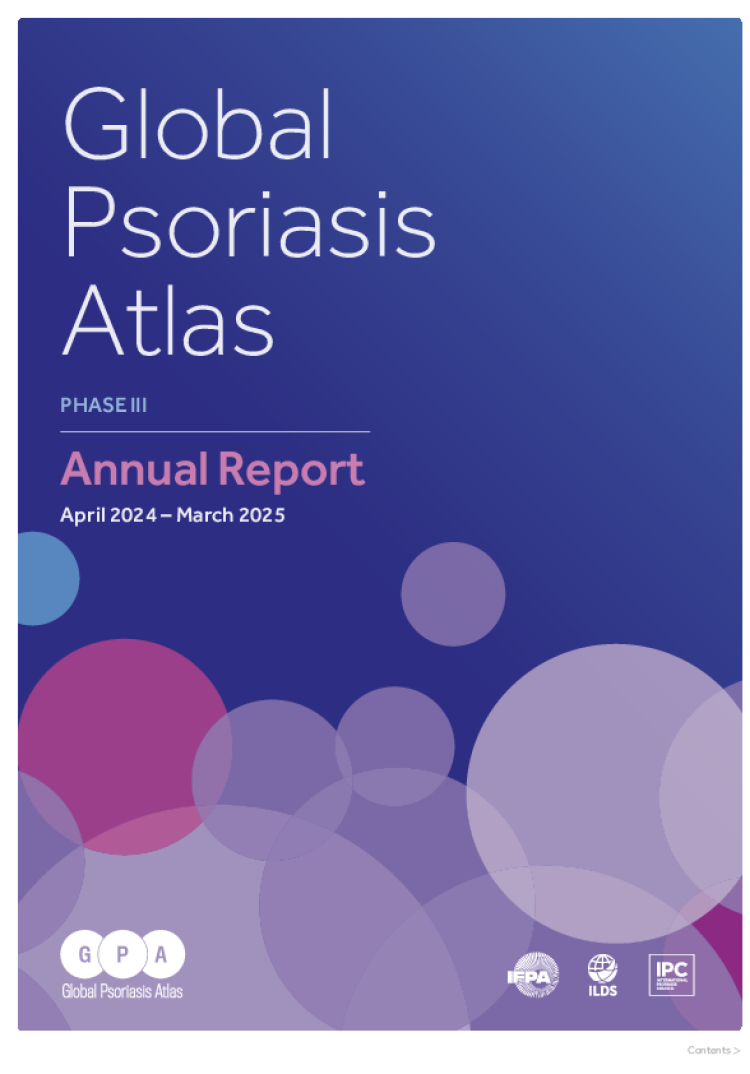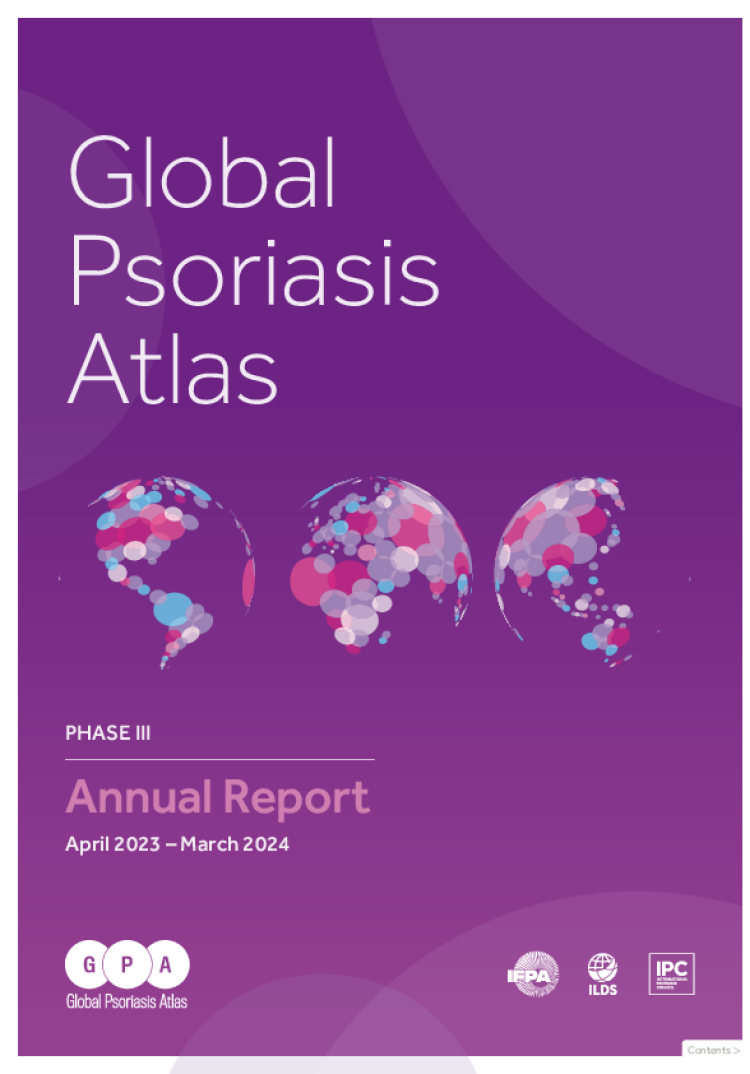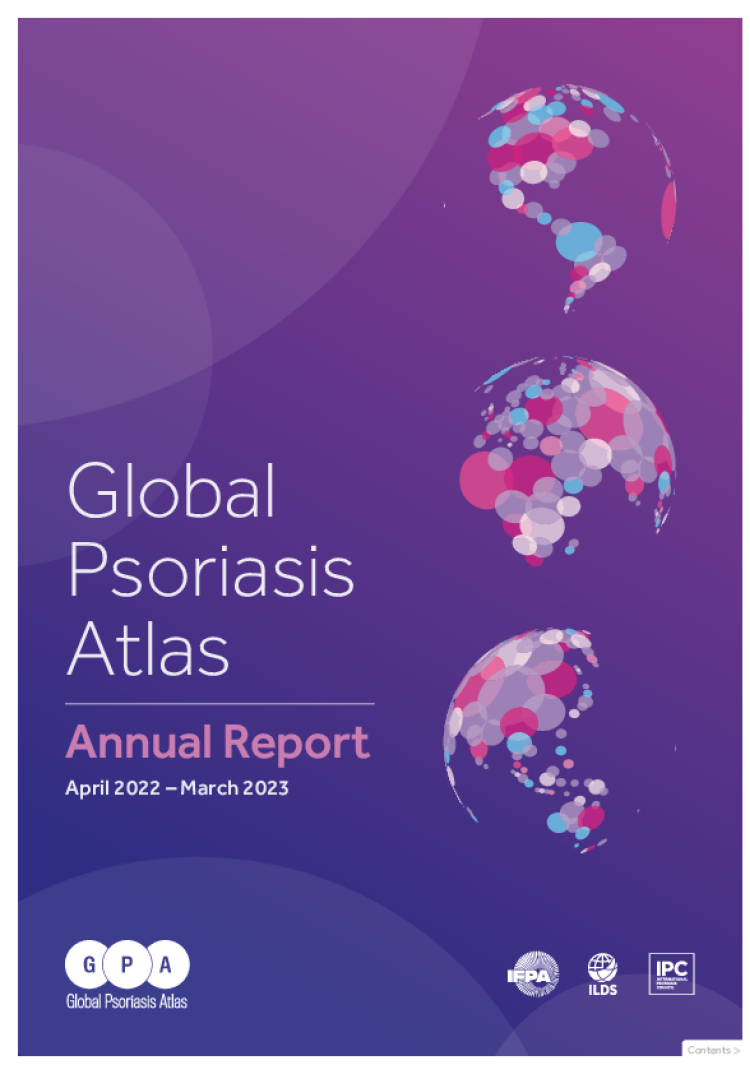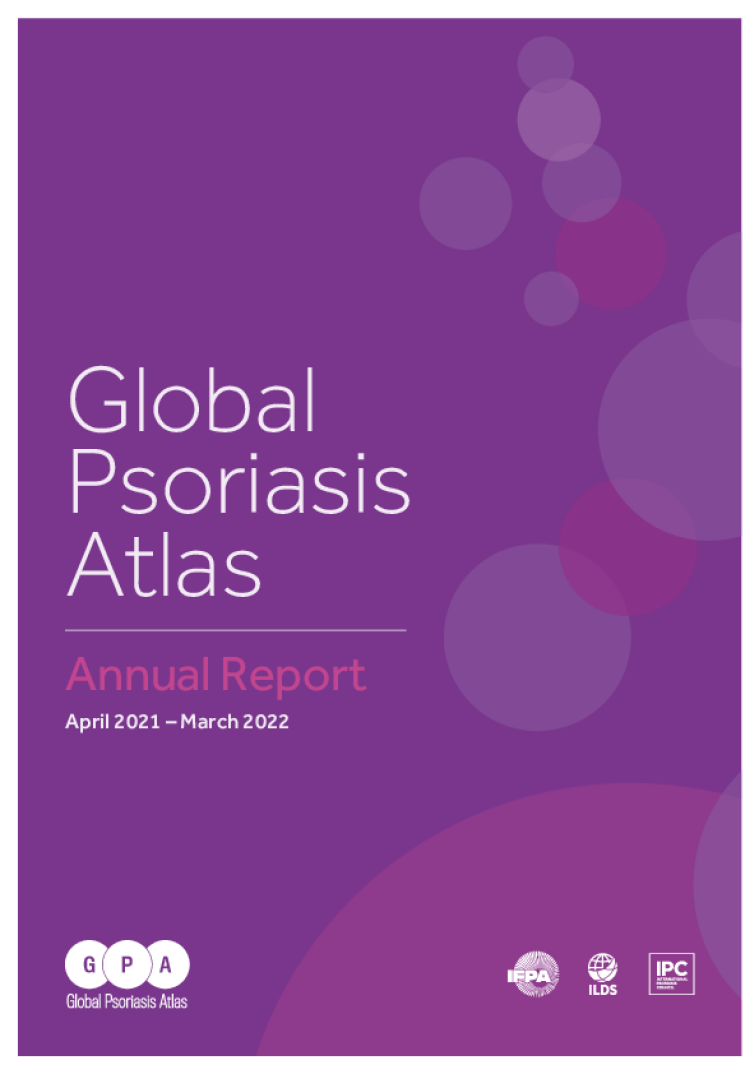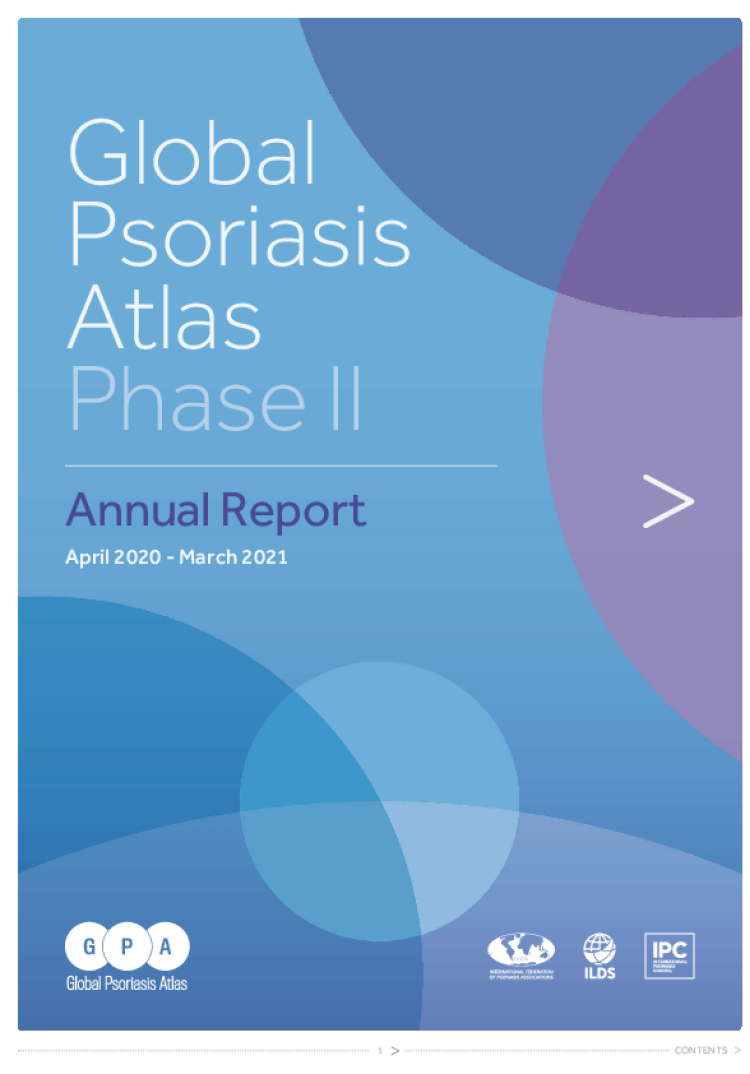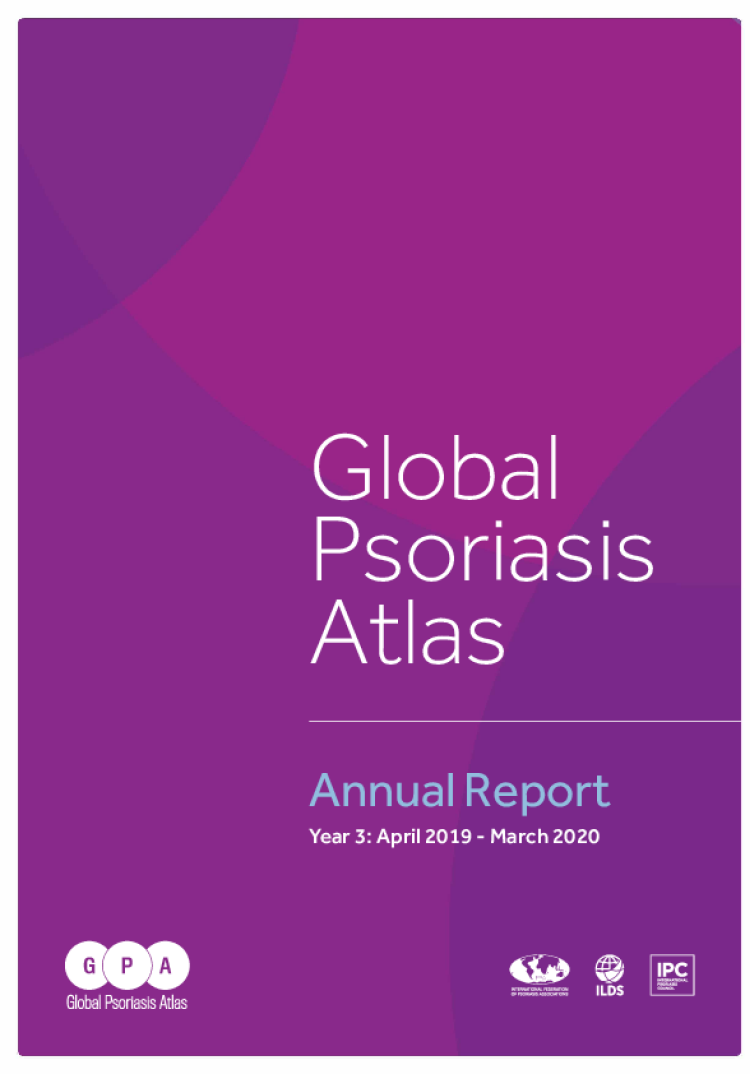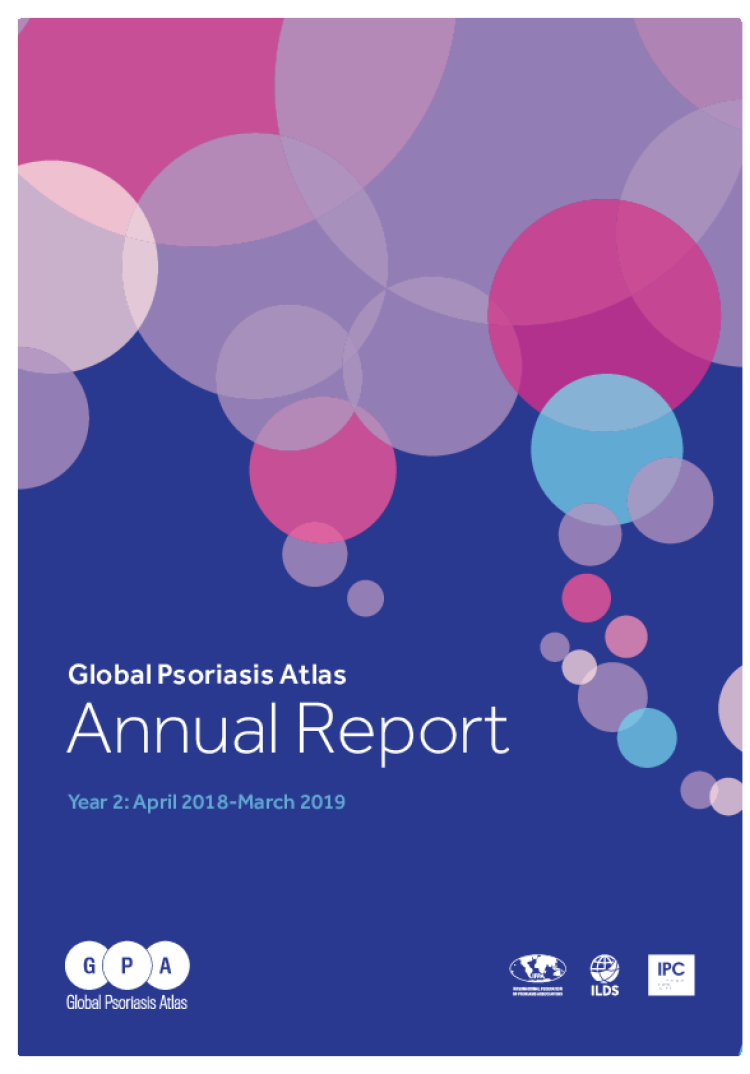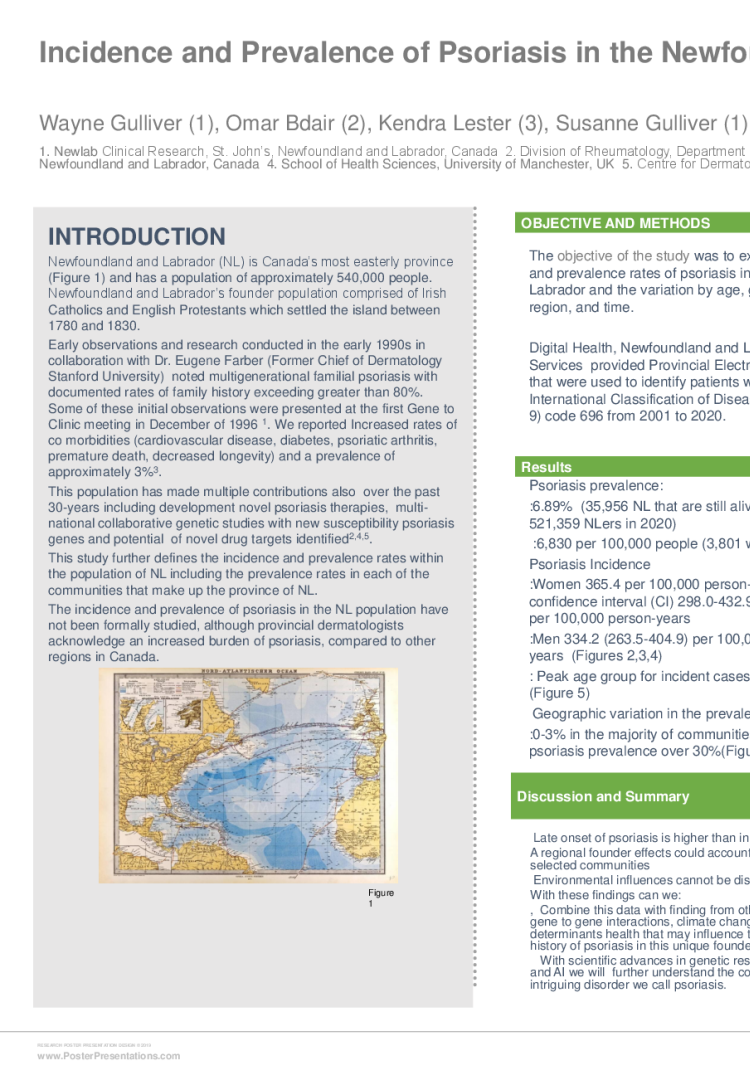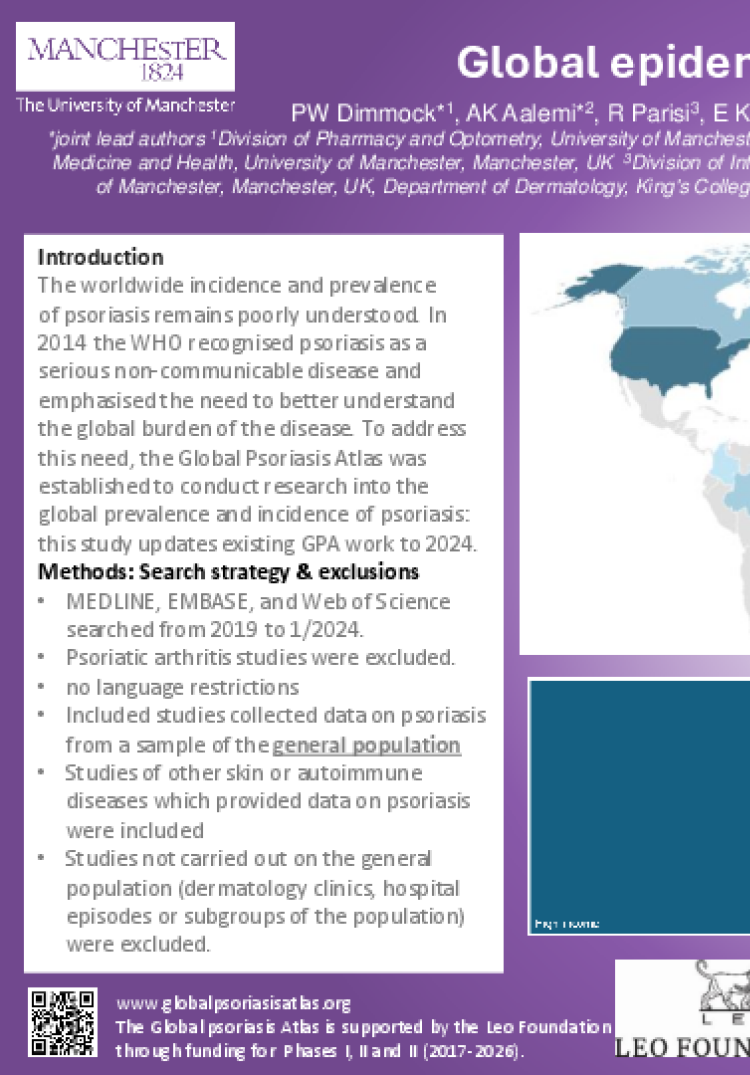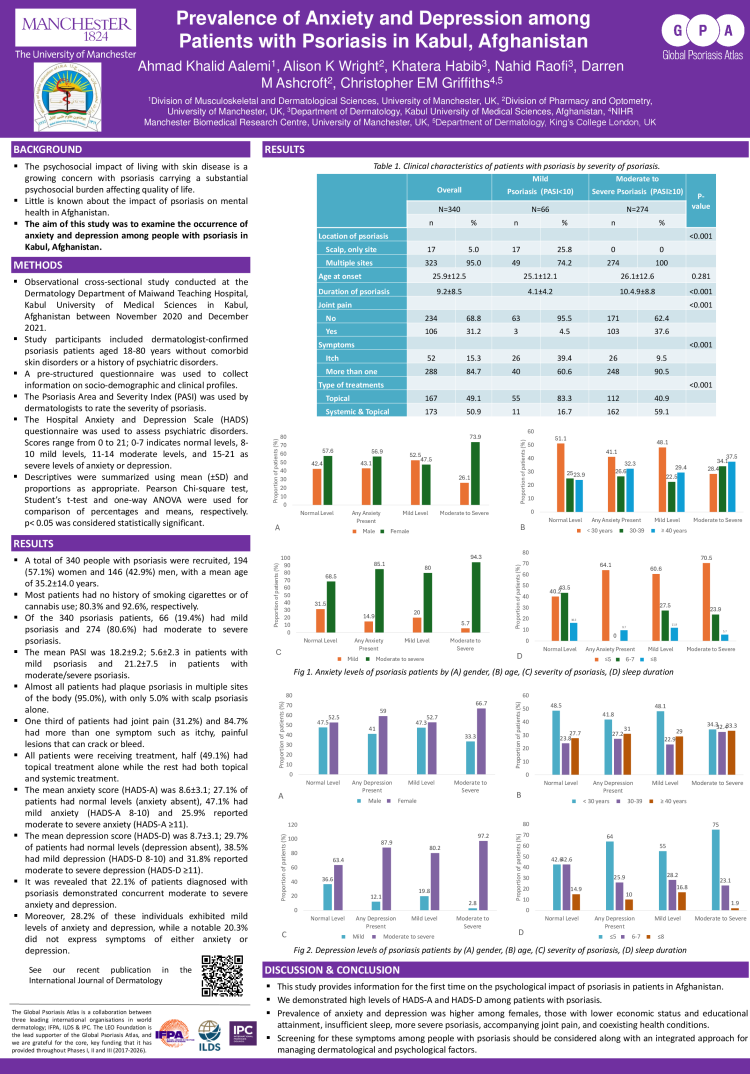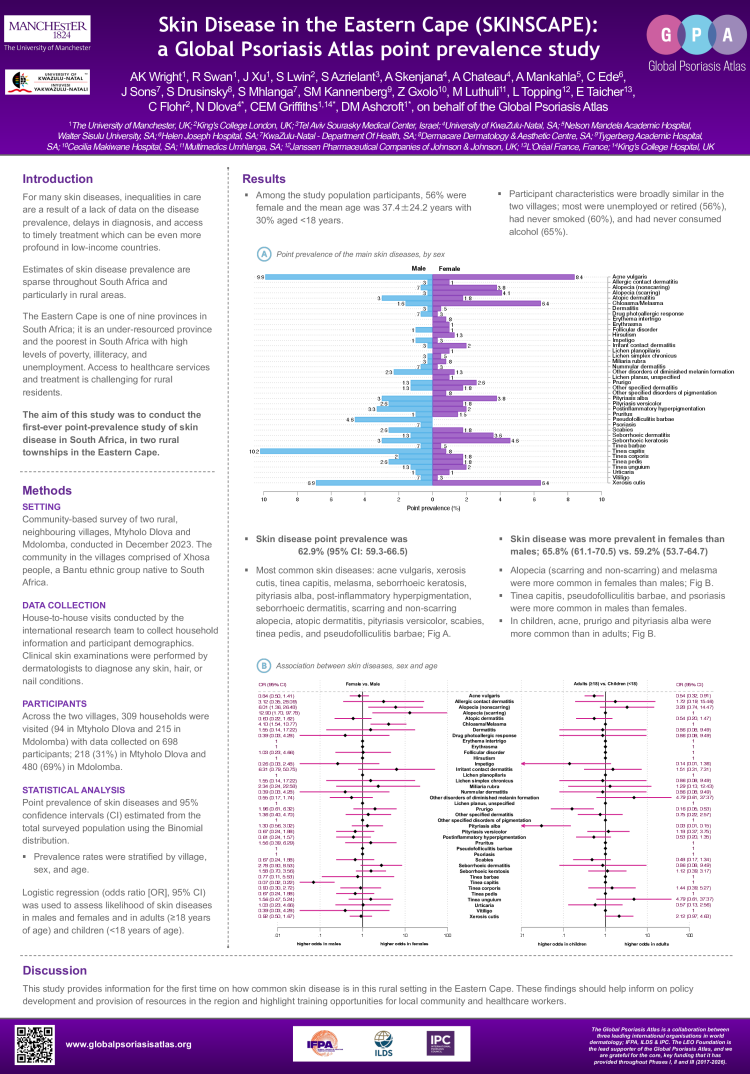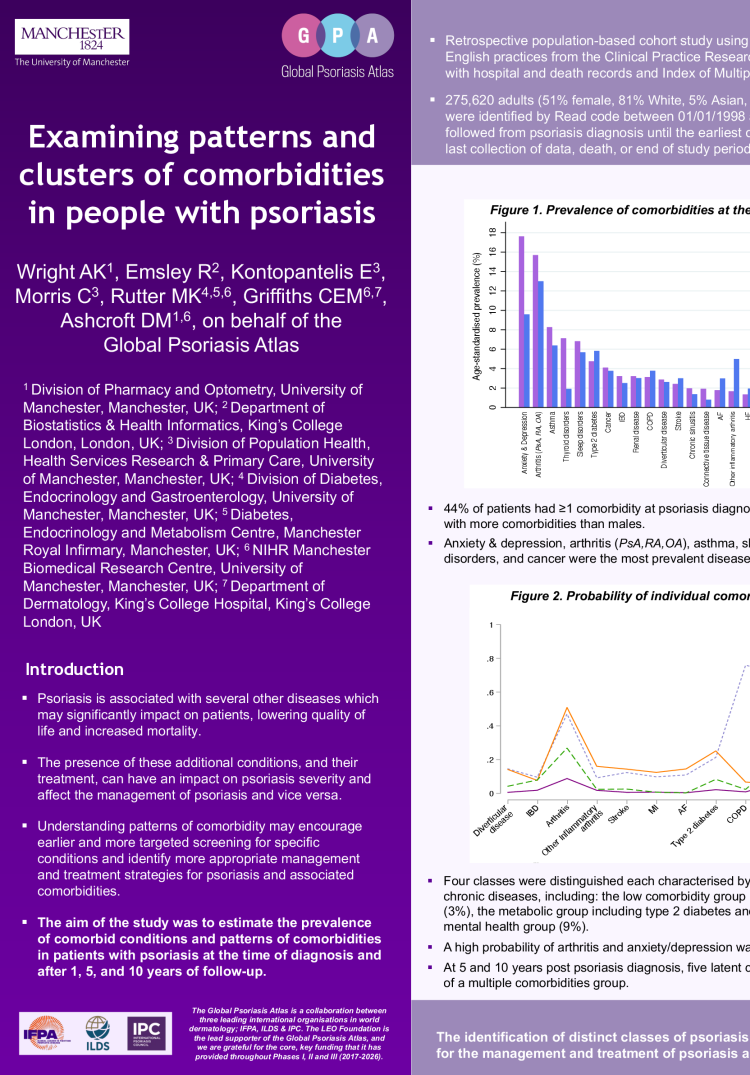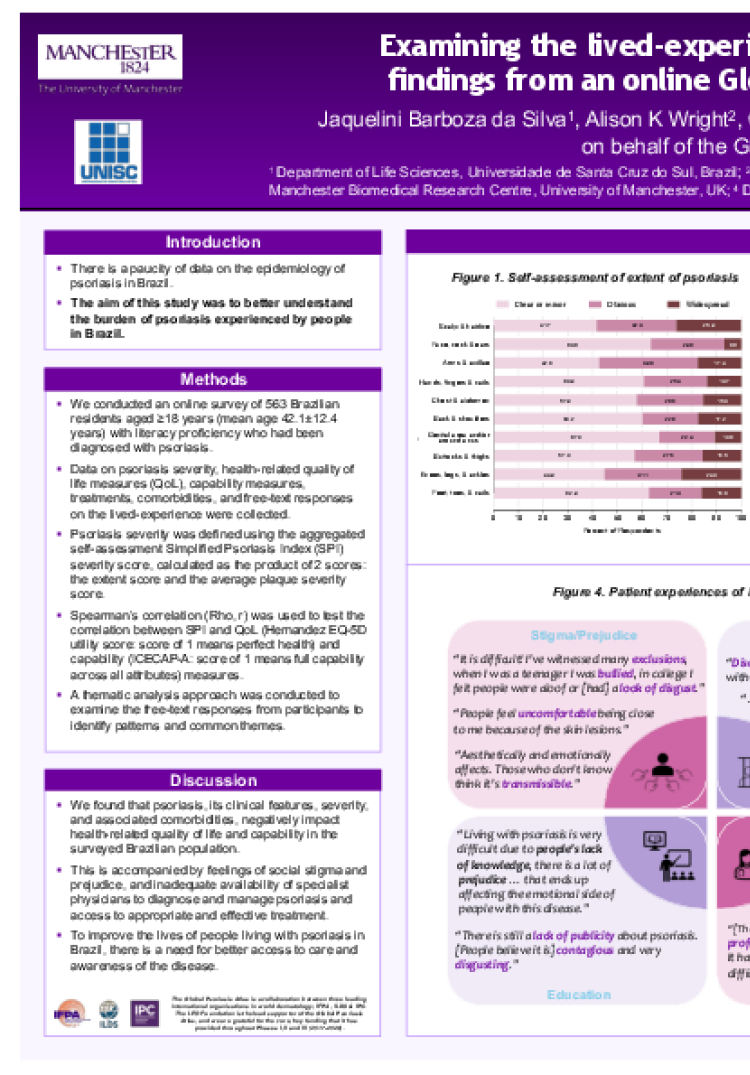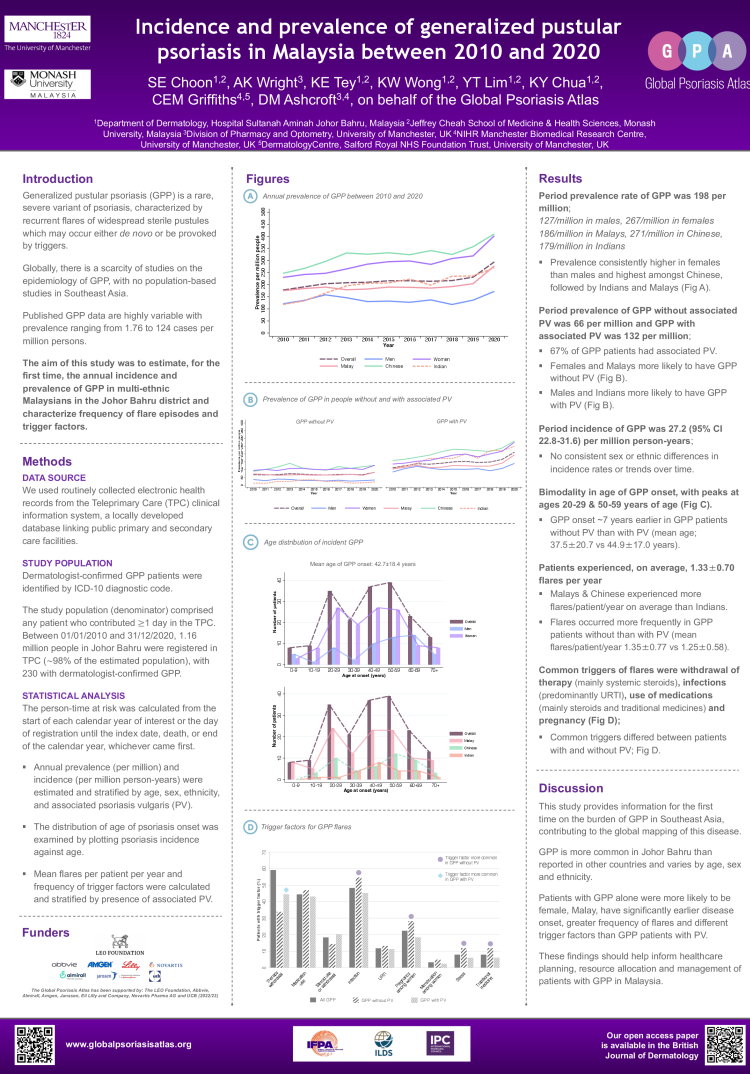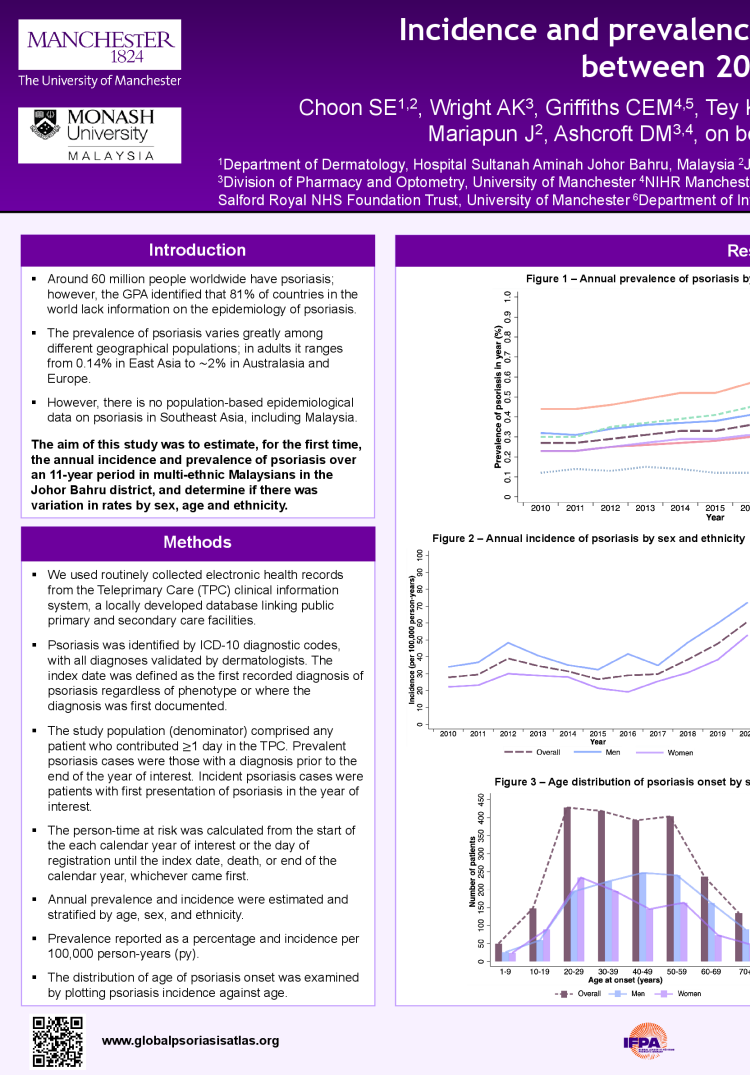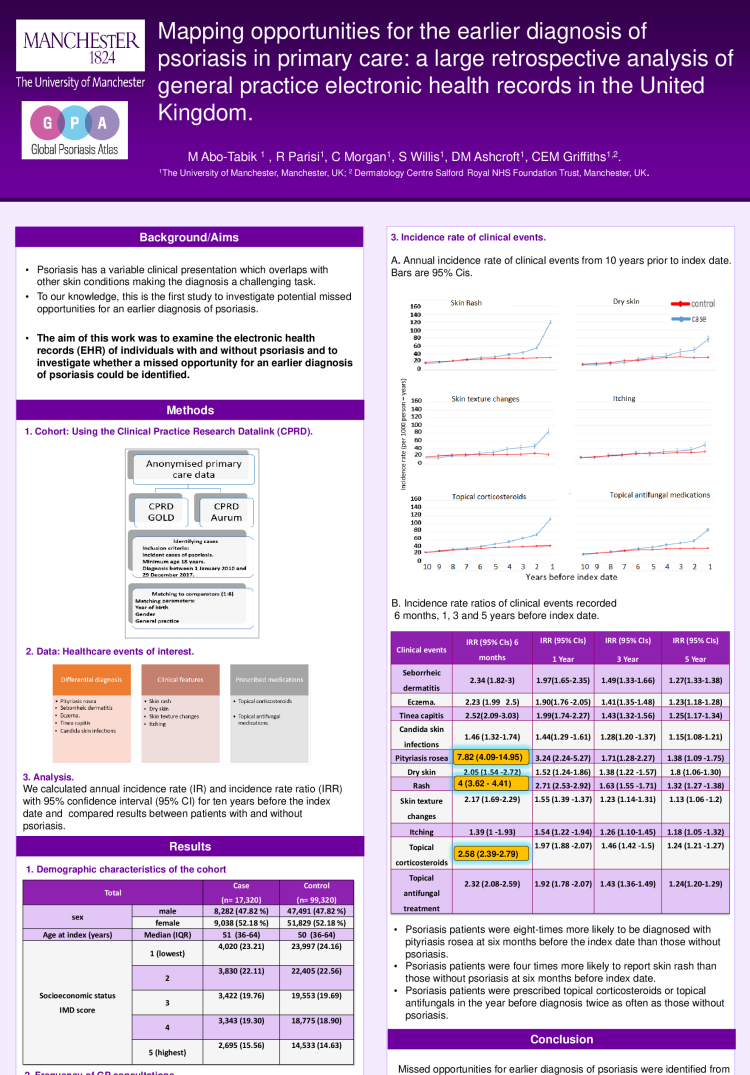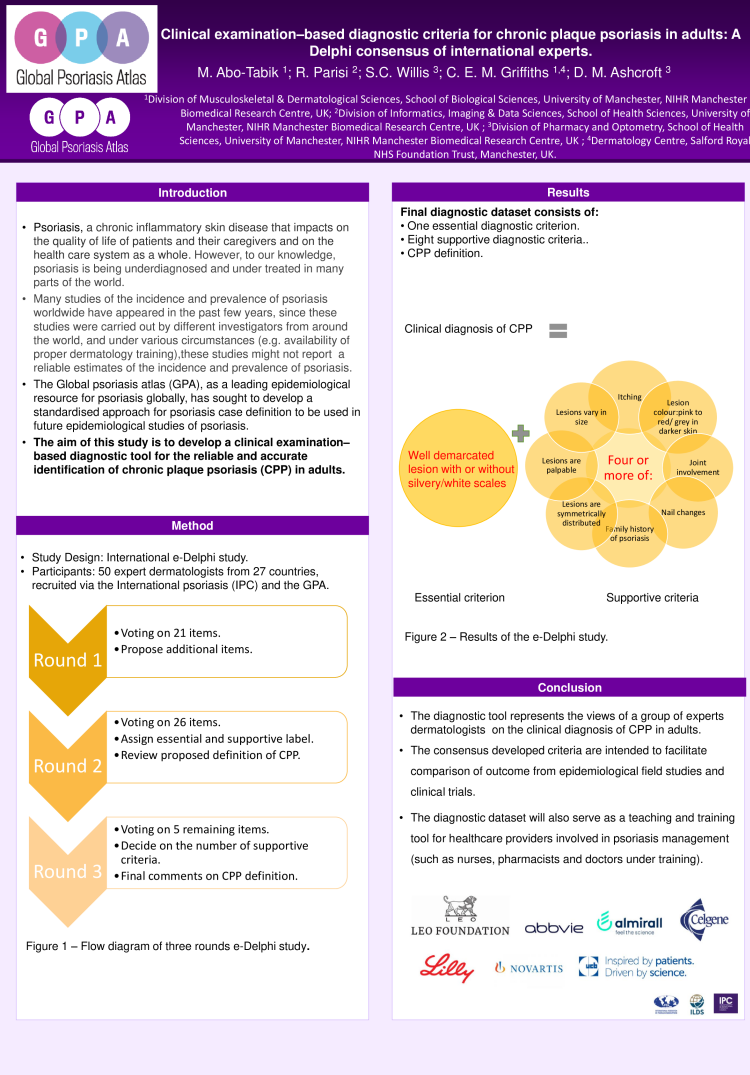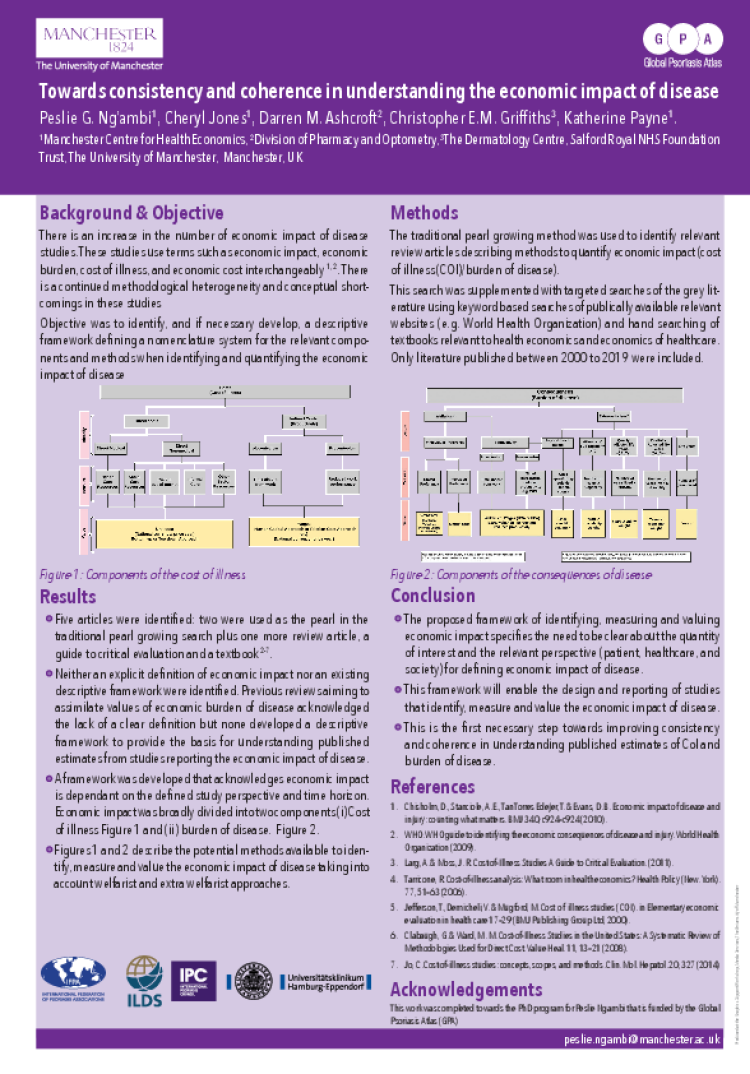Resources
In this section, you will find a range of GPA resources including our annual reports and publications.
WHAT IS PSORIASIS?
Psoriasis is a life-long skin condition, for which there is no cure.
It occurs when skin cells reproduce at a faster rate than normal. The skin cells build up and cause raised patches to form. These patches can be red (on Caucasian skin) or appear more as purple patches with grey scales (on darker skin tones). They can also be flaky, itchy and scaly.
Psoriasis can flare up anywhere on the body and can be severe or mild. Some people can go for long periods without their psoriasis flaring up, but other people may experience regular flare-ups. Its visibility and the misconception that it is contagious, means it is often stigmatising. This is an additional burden to the physical discomfort it may cause. Psoriasis affects people physically and psychologically, and has also been associated with other conditions.
One of the aims of the GPA is to understand the number of people around the world who are affected by psoriasis, and what care and treatment is available to them wherever they may live. We know that psoriasis can be managed well if people receive appropriate and timely advice and treatment.
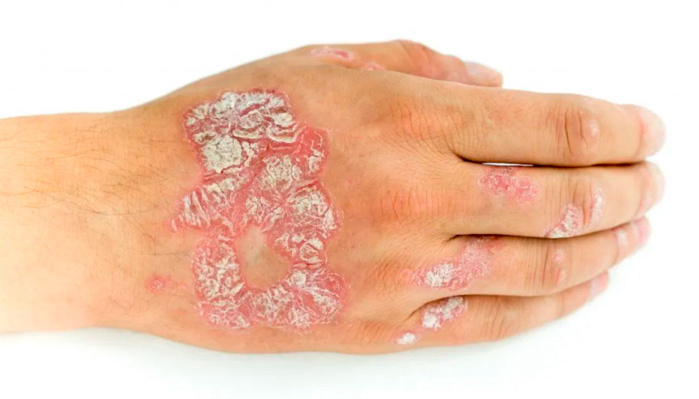
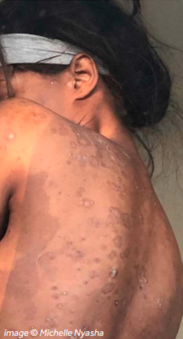
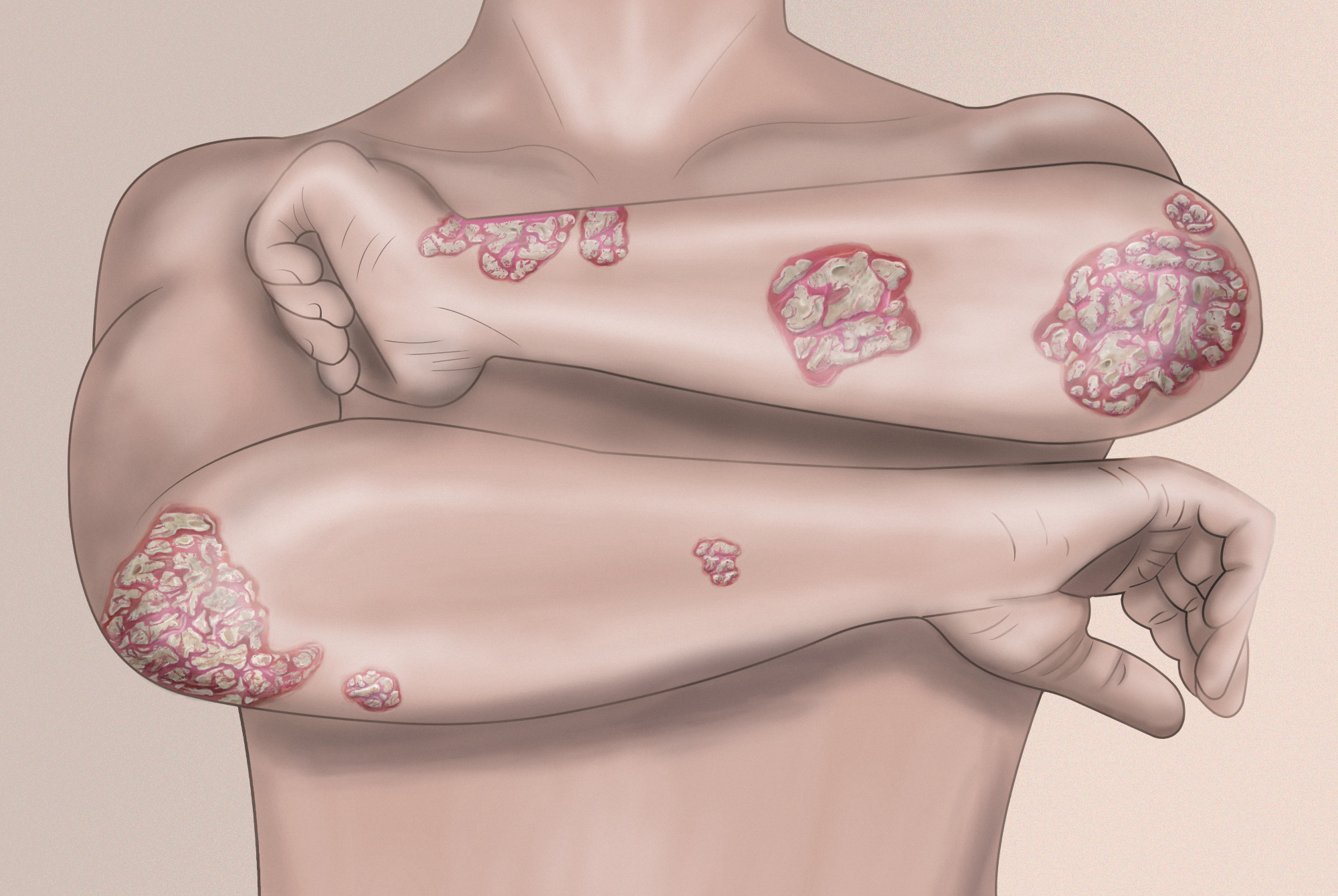
GPA ARTICLES
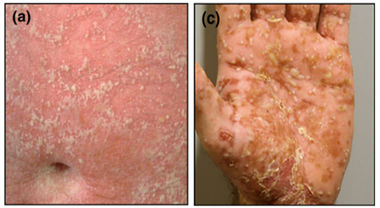
PUSTULAR PSORIASIS RESEARCH PROGRESS
Psoriasis is a chronic, immune-mediated inflammatory disease that affects at least 60 million people worldwide.
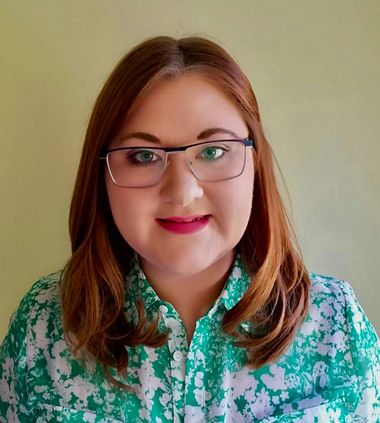
INTRODUCING ALISON WRIGHT
Research Associate, Dr Alison Wright, joined the GPA team in January 2021 with plans to extend our work programme by improving our understanding of multi-morbidity in people with psoriasis.

ANNOUNCING THE LAUNCH OF OUR NEW WEBSITE
The Global Psoriasis Atlas (GPA) team are excited to announce the launch of our newly designed website. We wanted to create a site that is faster, easier to navigate and more user-friendly.

COMMON MISCONCEPTIONS ABOUT PSORIASIS
Psoriasis is a long-lasting, immune-mediated skin disease. Because of its visibility and misconception that it is contagious, it is often stigmatising. This is an additional burden to the physical discomfort it may cause.
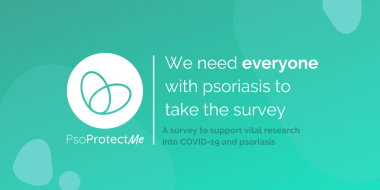
THE PSOPROTECT ME SURVEY
For people with psoriasis, the Covid-19 pandemic has likely resulted in shifts in medication and healthcare practices, social behaviours and emotional wellbeing.
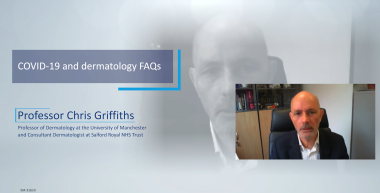
COVID-19 AND DERMATOLOGICAL CONDITIONS
Professor Chris Griffiths explains how individuals can reduce the risk of spreading COVID-19 through behavioural and lifestyle modifications.

LIVING WITH PSORIASIS
Psoriasis can have a profound impact on a person's quality of life, including their physical and emotional well-being and their activities of daily living.
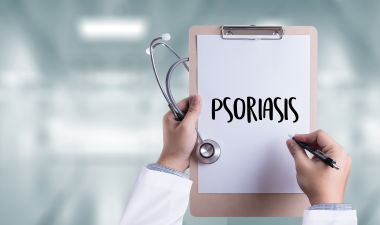
DEVELOPING CLINICAL DIAGNOSTIC CRITERIA FOR PSORIASIS
Global Psoriasis Atlas PhD Student, Maha Abo-Tabik, is working to develop a diagnostic criteria for psoriasis. Her aim is to develop a clinical examination-based diagnostic tool for chronic plaque psoriasis in adults (age 18 years and above).
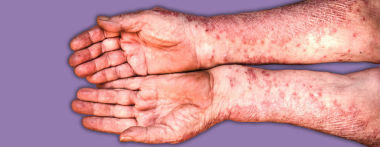
PSORIASIS AND CANCER
GPA PhD student, Alex Trafford, completed a systematic review and meta-analysis on the “Association of Psoriasis with the Risk of Developing or Dying of Cancer” now published in, JAMA Dermatology.

HOW TO LEAD A FULL LIFE WITH PSORIASIS
Living with psoriasis can be tough. If you are one of the many millions who has this complex skin condition, you will already know how frustrating and challenging it can be to cope with the symptoms.

WHY YOU SHOULD CONNECT WITH OTHER PEOPLE WHO HAVE PSORIASIS
At least 60 million people in the world have psoriasis. Although there are many questions that remain unanswered about this complex disease, one thing is certain: we are stronger when we connect.

A FIRST FOR PEOPLE WITH PSORIASIS AND EXPERTS
Years of dedicated work has led to the launch of the world’s first Global Psoriasis Atlas.
NEWSLETTERS
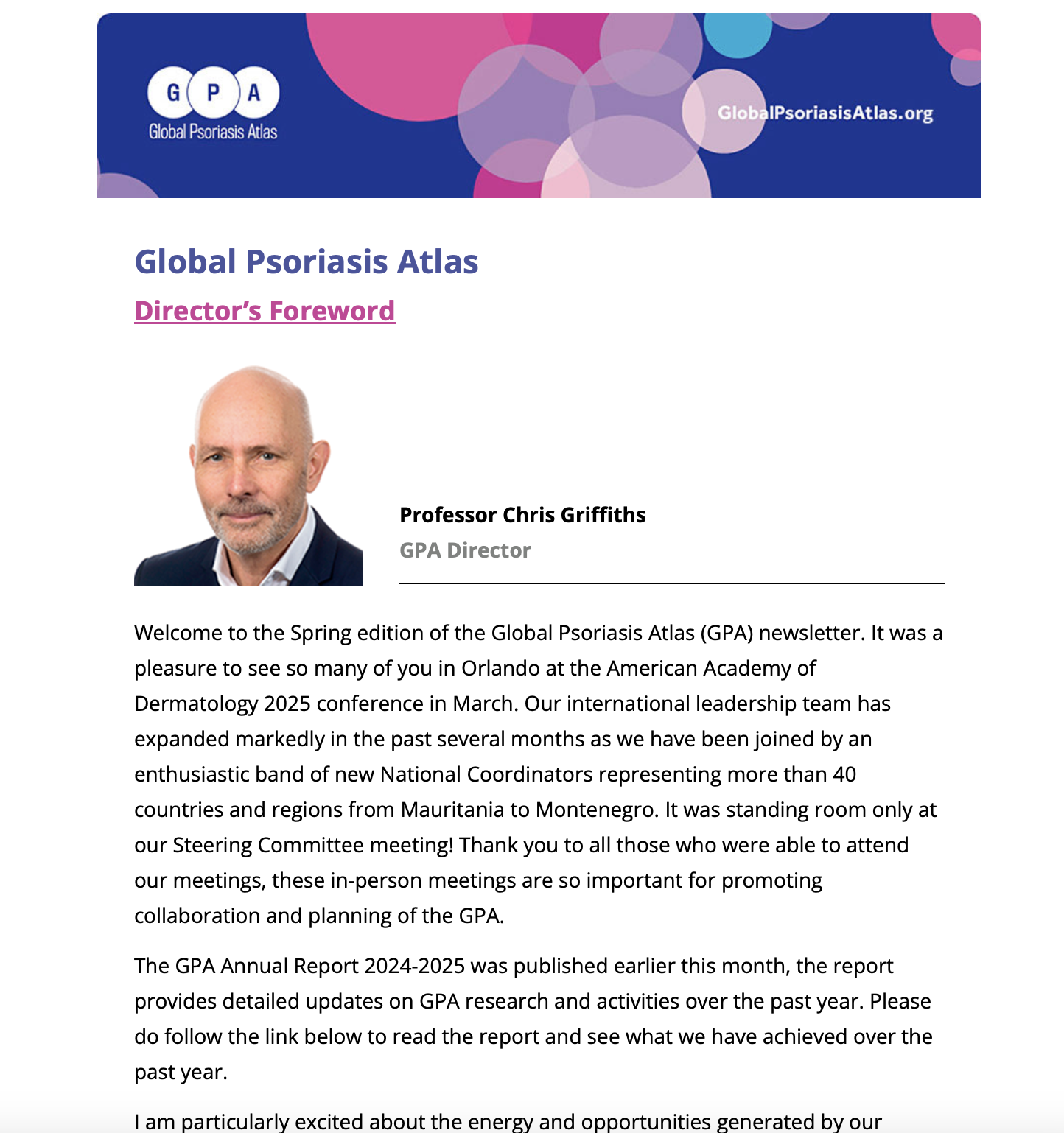
Global Psoriasis Atlas Quarterly Newsletter - April 2025 - Issue No. 26
Welcome to the Spring edition of the Global Psoriasis Atlas (GPA) newsletter. It was a pleasure to see so many of you in Orlando at the American Academy of Dermatology 2025 conference in March....
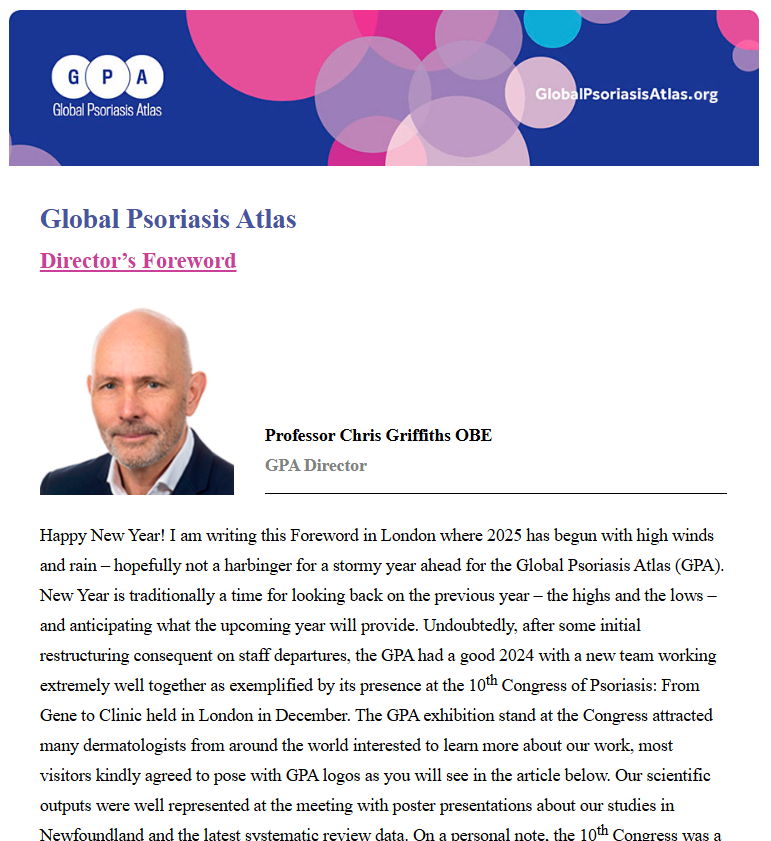
Global Psoriasis Atlas Quarterly Newsletter - January 2025 - Issue No. 25
Happy New Year! I am writing this Foreword in London where 2025 has begun with high winds and rain – hopefully not a harbinger for a stormy year ahead for the Global Psoriasis Atlas (GPA)...
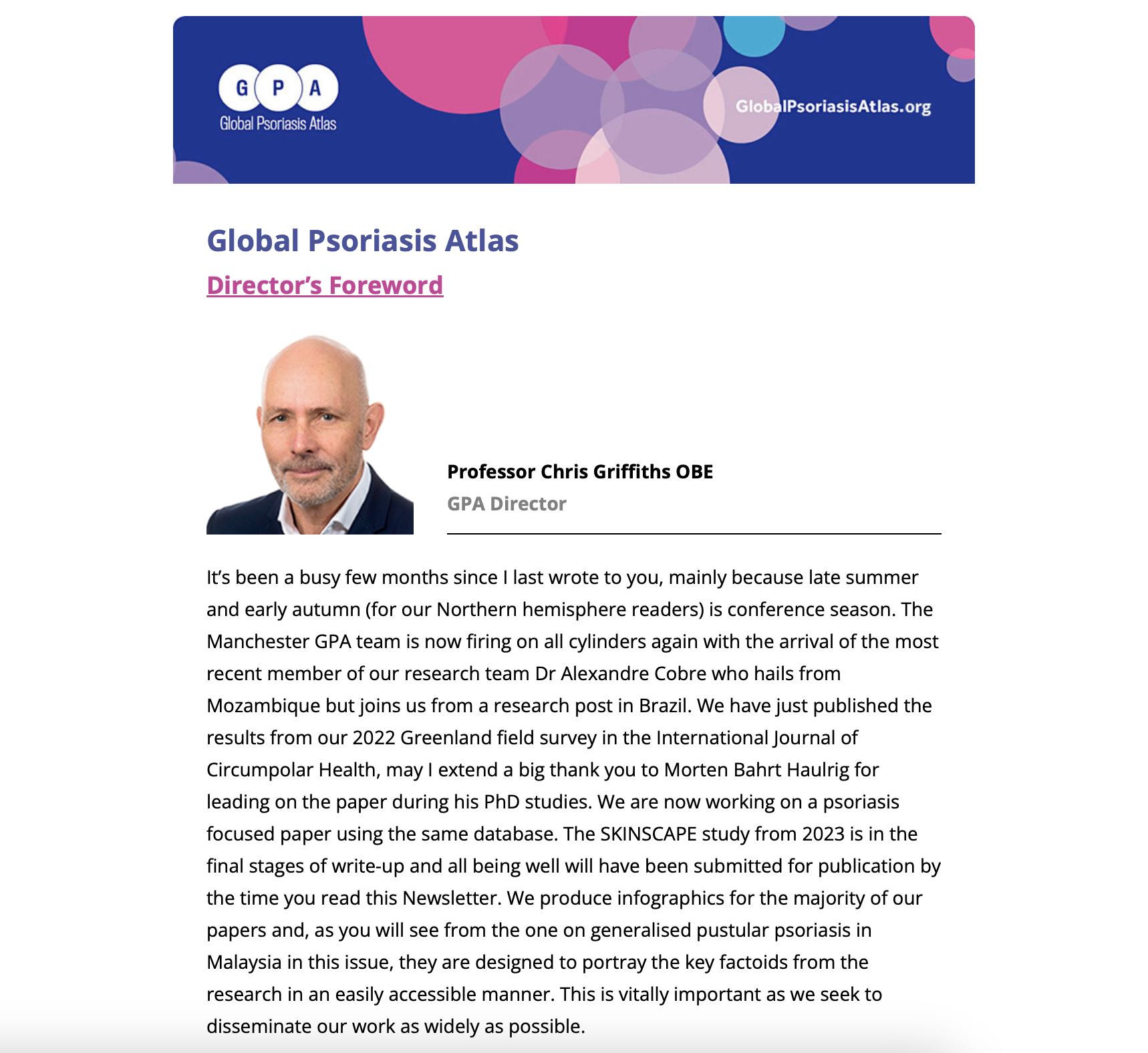
Global Psoriasis Atlas Quarterly Newsletter - October 2024 - Issue No. 24
It’s been a busy few months since I last wrote to you, mainly because late summer and early autumn (for our Northern hemisphere readers) is conference season...
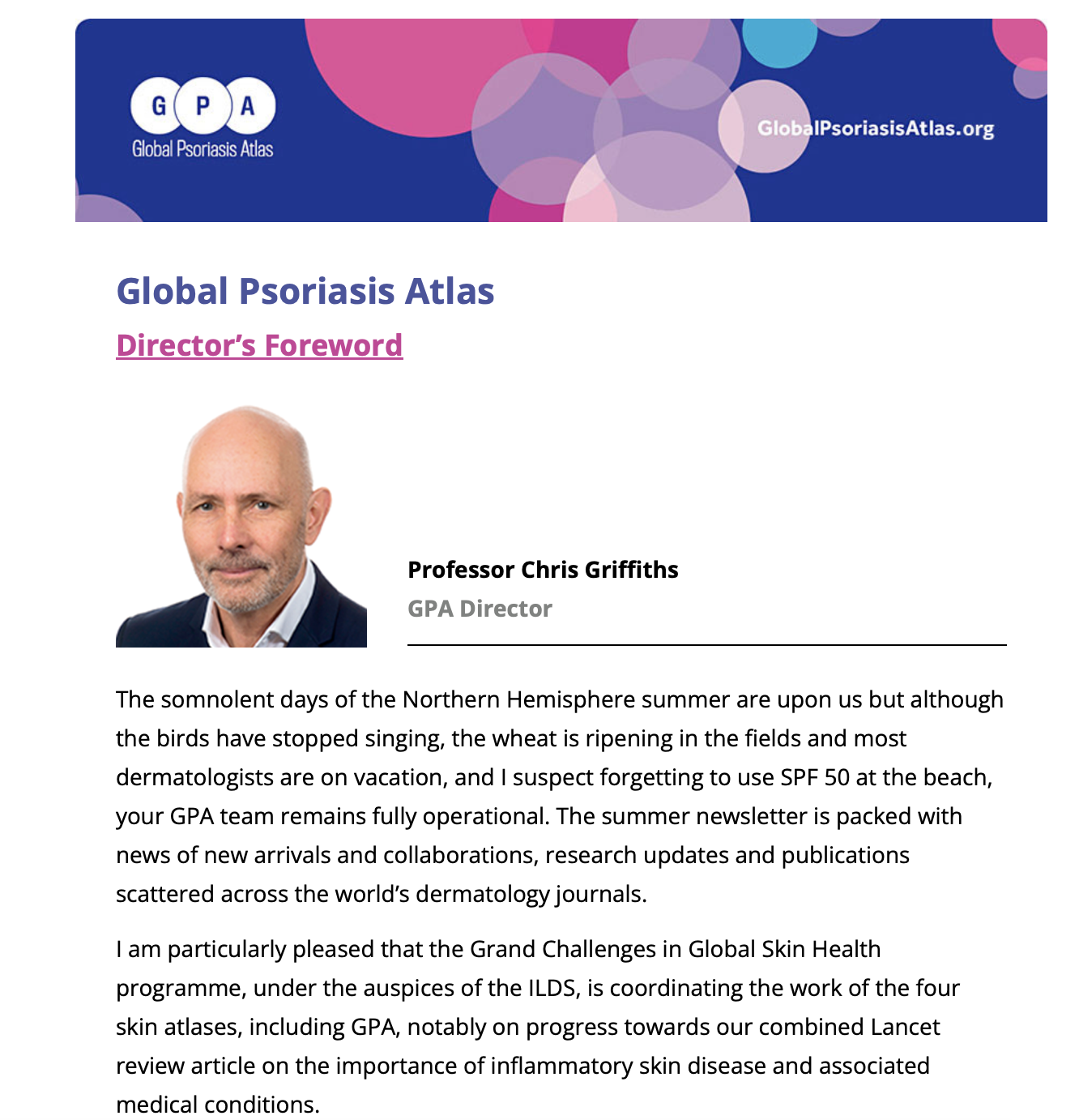
Global Psoriasis Atlas Quarterly Newsletter - July 2024 - Issue No. 23
The somnolent days of the Northern Hemisphere summer are upon us but although the birds have stopped singing...
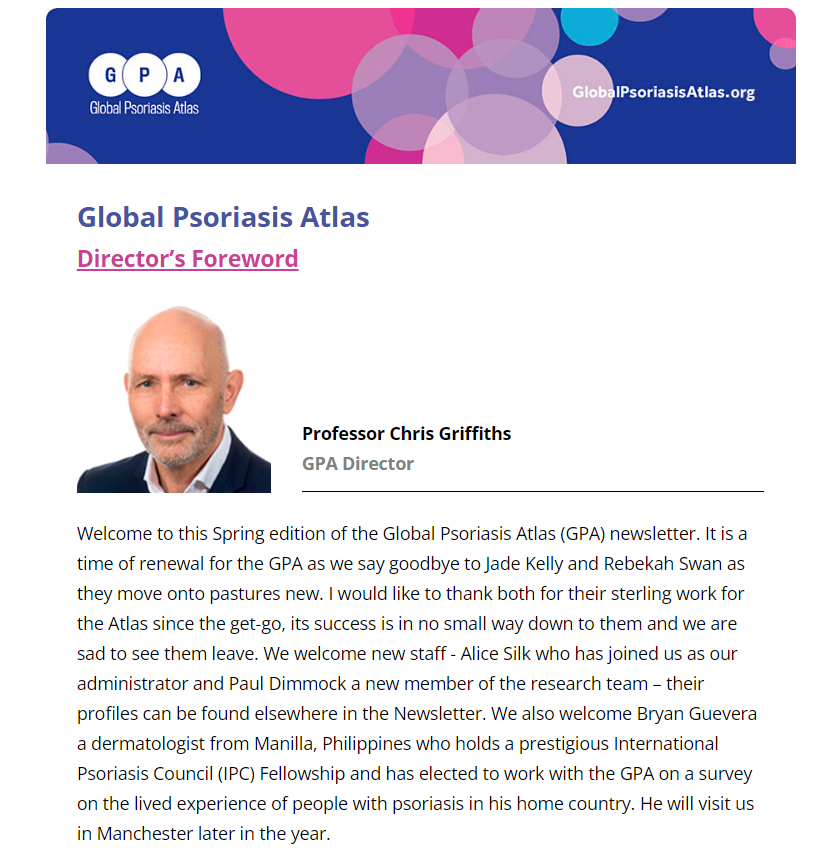
Global Psoriasis Atlas Quarterly Newsletter - April 2024 - Issue No. 22
Welcome to this Spring edition of the Global Psoriasis Atlas (GPA) newsletter.
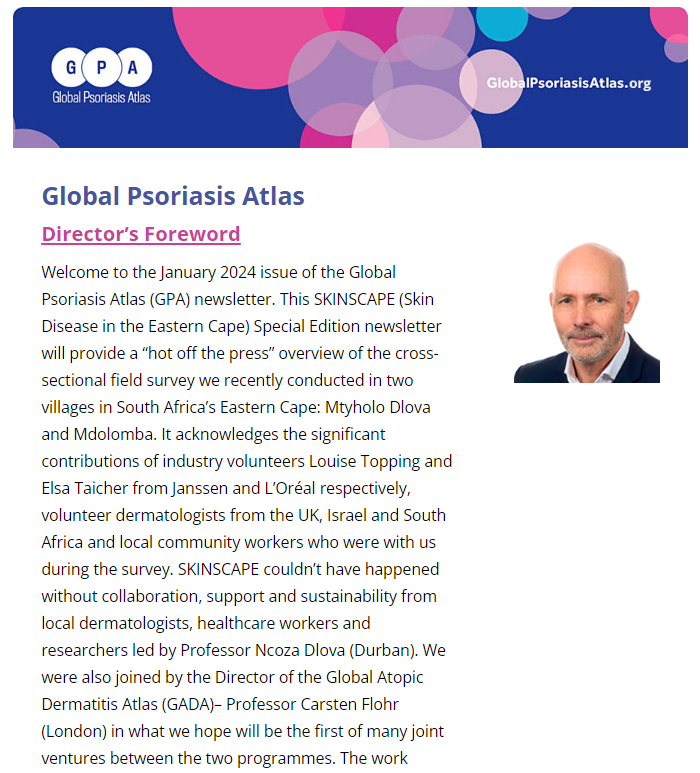
Global Psoriasis Atlas Quarterly Newsletter - January 2024 - Issue No. 21
Welcome to the January 2024 issue of the Global Psoriasis Atlas (GPA) newsletter.
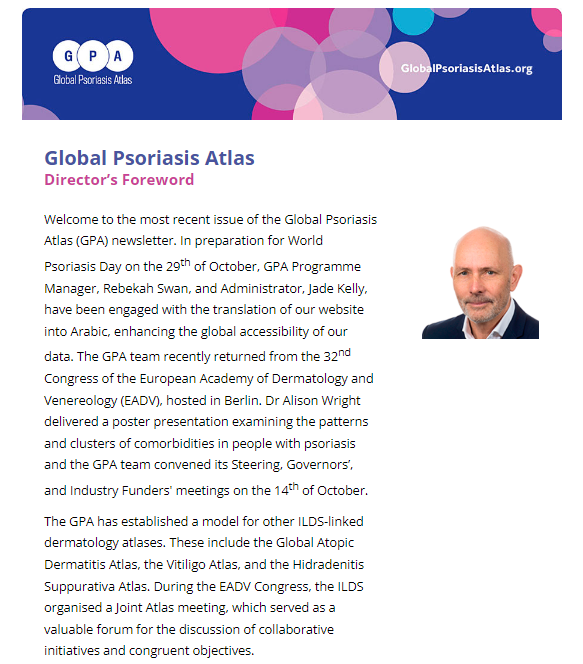
Global Psoriasis Atlas Quarterly Newsletter – October 2023 - Issue No. 20
Welcome to the most recent issue of the Global Psoriasis Atlas (GPA) newsletter.
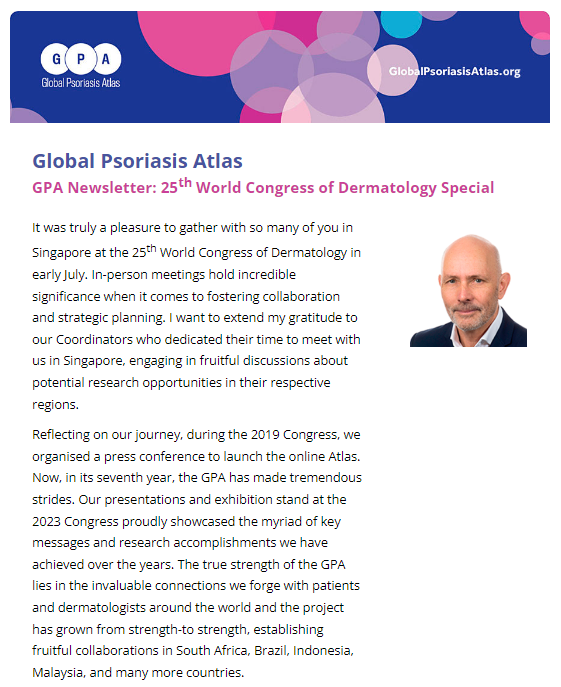
Quarterly Newsletter - July 2023 - Issue No. 19 - 25th World Congress of Dermatology Special
It was truly a pleasure to gather with so many of you in Singapore...
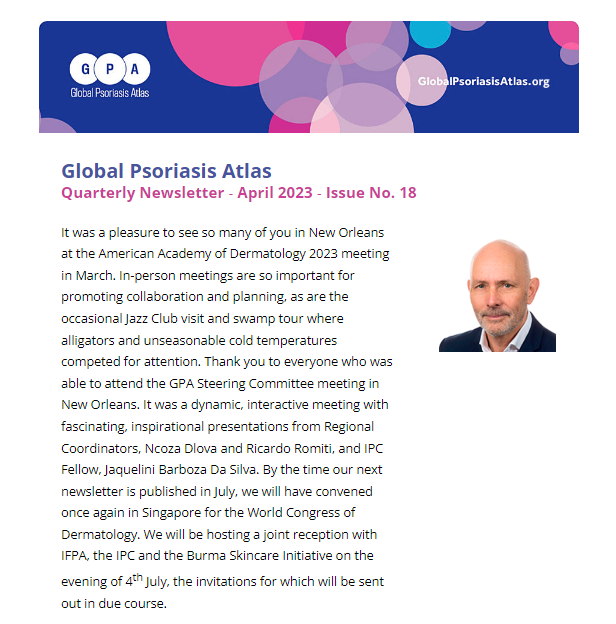
Global Psoriasis Atlas Quarterly Newsletter - April 2023 - Issue No. 18
It was a pleasure to see so many of you in New Orleans ar the AAD 2023 meeting in March.
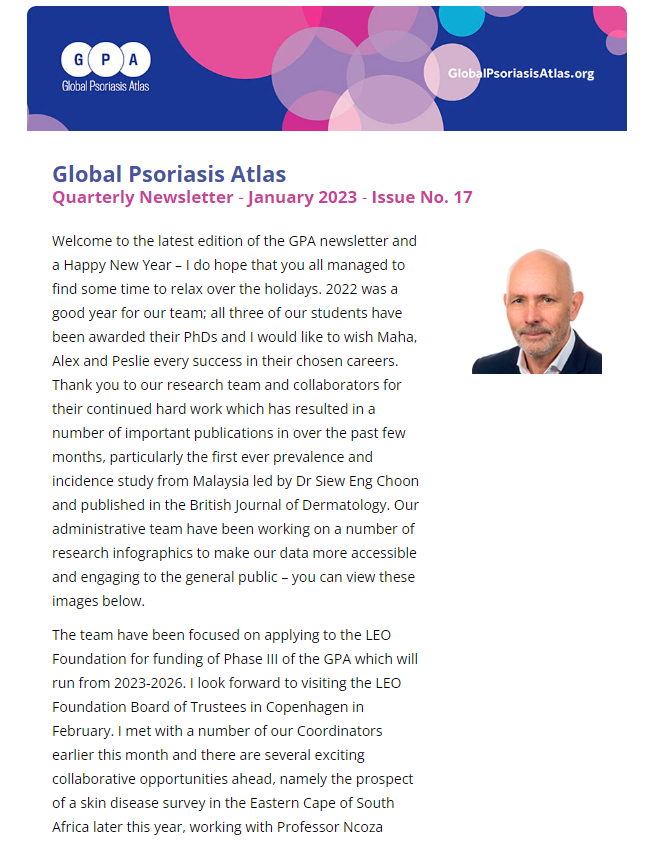
Global Psoriasis Atlas Quarterly Newsletter - January 2023 - Issue No. 17
Welcome to the seventeenth edition of the Global Psoriasis Atlas (GPA) newsletter.
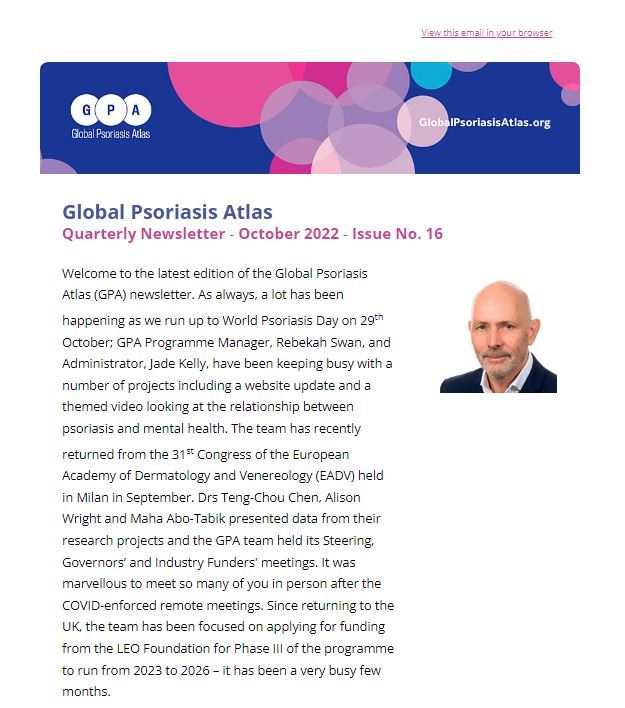
Global Psoriasis Atlas Quarterly Newsletter - October 2022 - Issue No. 16
Welcome to the sixteenth edition of the Global Psoriasis Atlas (GPA) newsletter.
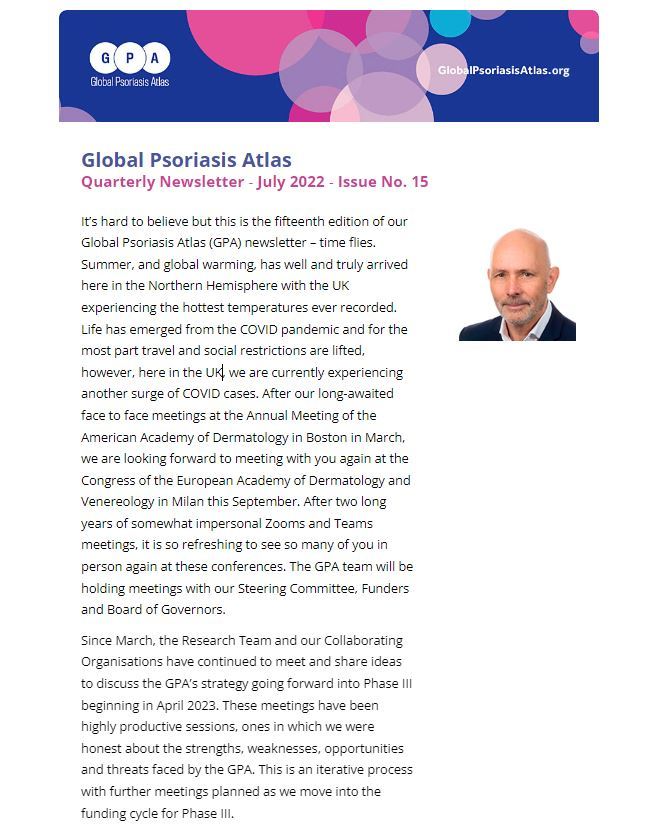
Global Psoriasis Atlas Quarterly Newsletter - July 2022 - Issue No. 15
Welcome to the fifteenth edition of the Global Psoriasis Atlas (GPA) newsletter.
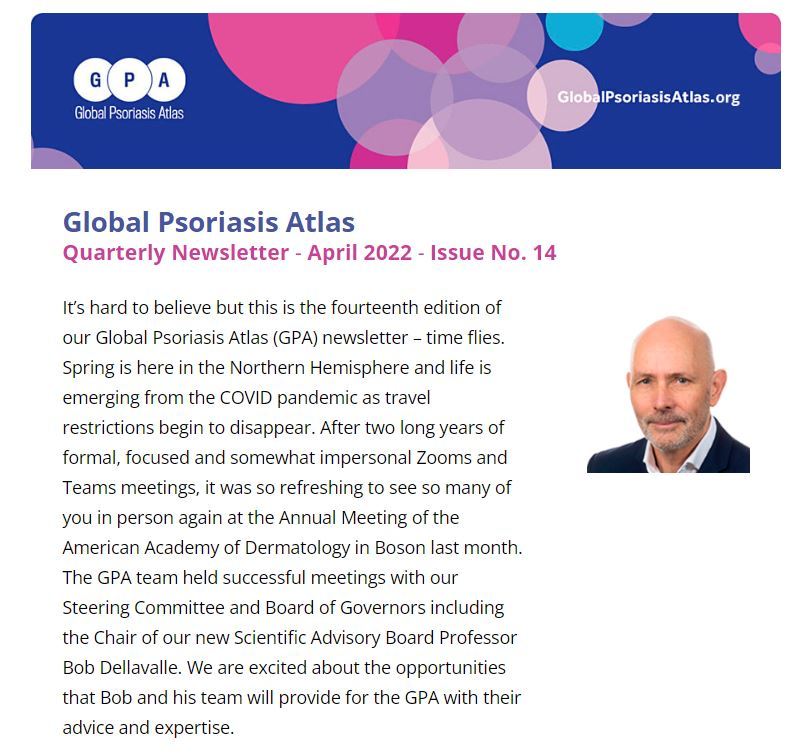
Global Psoriasis Atlas Quarterly Newsletter - April 2022 - Issue No. 14
Welcome to the fourteenth edition of the Global Psoriasis Atlas (GPA) newsletter.
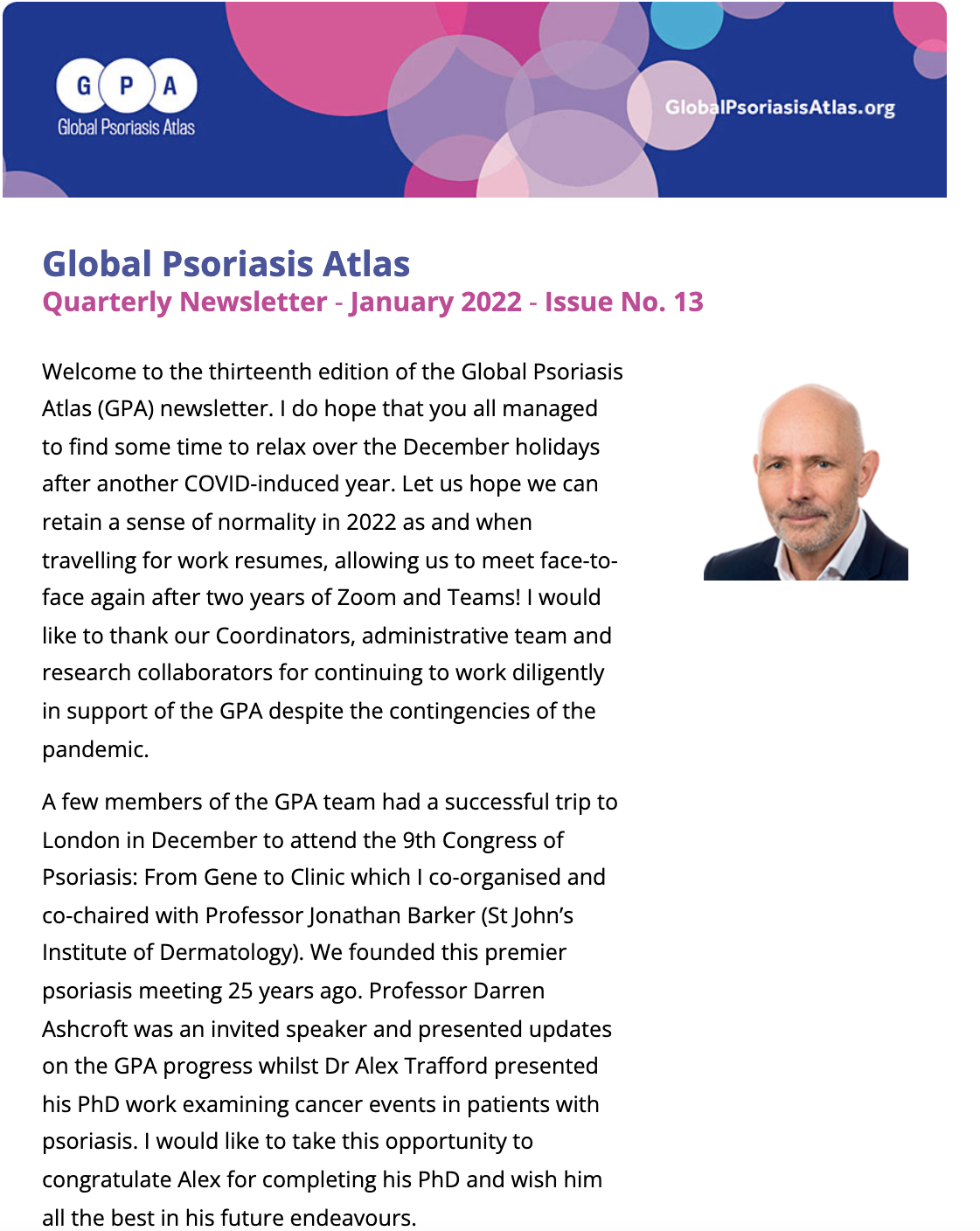
Global Psoriasis Atlas Quarterly Newsletter - January 2022 - Issue No. 13
Welcome to the thirteenth edition of the Global Psoriasis Atlas (GPA) newsletter.
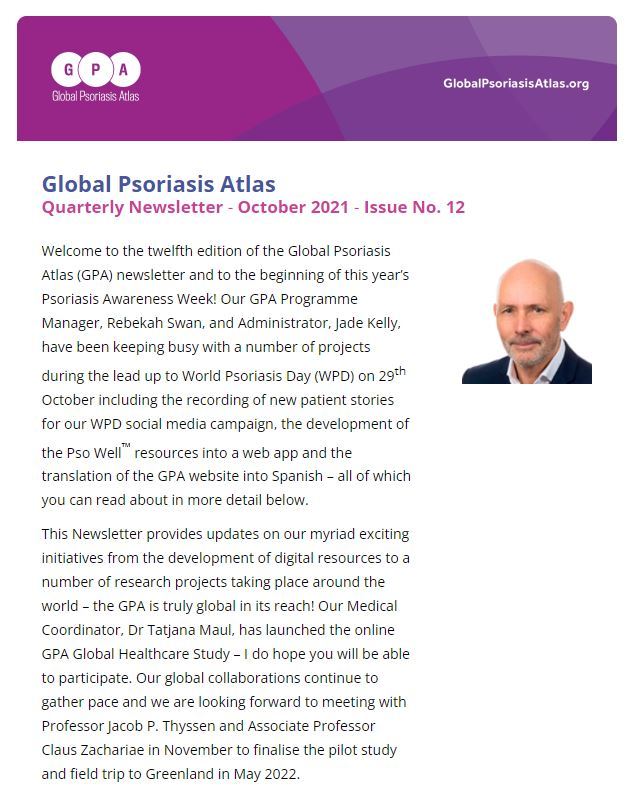
Global Psoriasis Atlas Quarterly Newsletter - October 2021 - Issue No. 12
Welcome to the twelfth edition of the Global Psoriasis Atlas (GPA) newsletter.
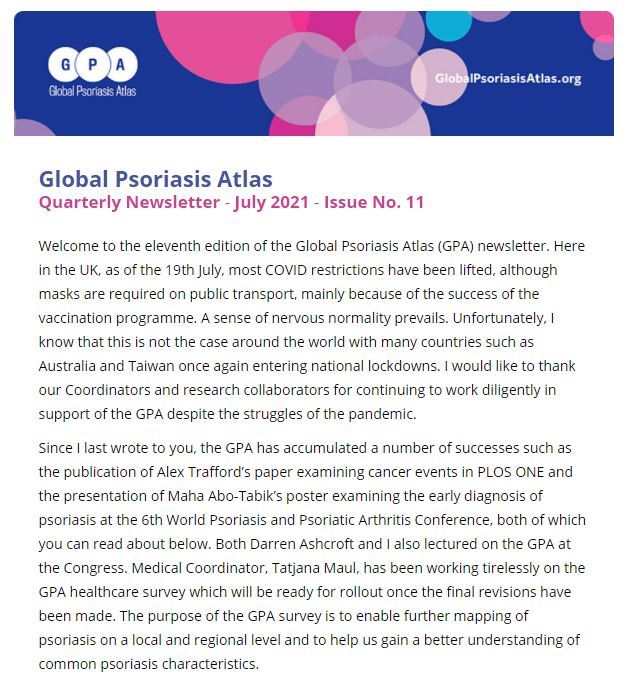
Global Psoriasis Atlas Quarterly Newsletter – July 2021 – Issue No. 11
Welcome to the eleventh edition of the Global Psoriasis Atlas (GPA) newsletter.
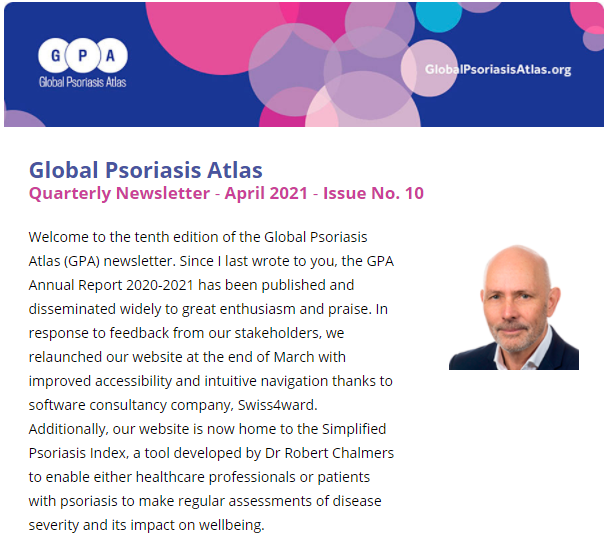
Global Psoriasis Atlas Quarterly Newsletter – April 2021 – Issue No. 10
Welcome to the tenth edition of the Global Psoriasis Atlas (GPA) newsletter.

